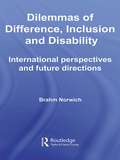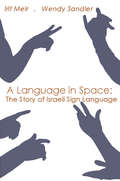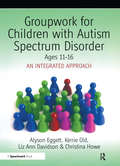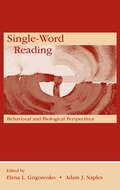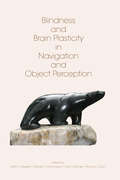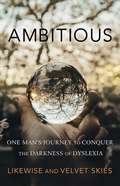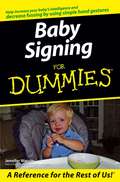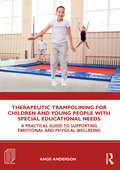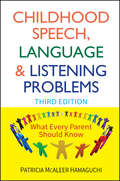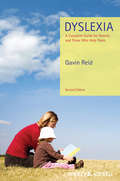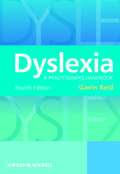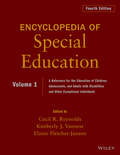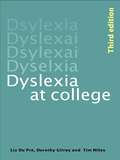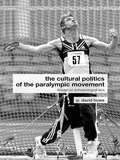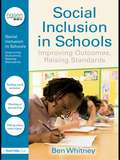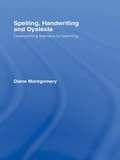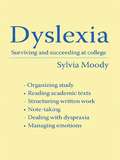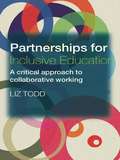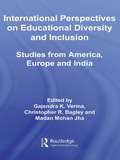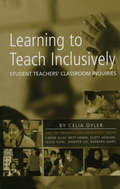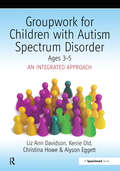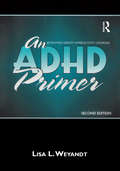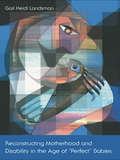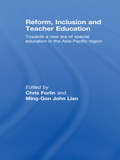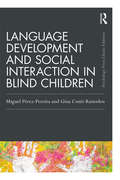- Table View
- List View
Dilemmas of Difference, Inclusion and Disability: International Perspectives and Future Directions
by Brahm Norwich**Shortlisted for the nasen Special Educational Needs Academic Book award 2008** Inclusion has become very influential internationally in the field of schooling. This has involved the introduction of policies that pursue more provision for, and acceptance of, students with special educational needs or disabilities in ordinary school settings. However, these policies represent different and often conflicting values and approaches to education. The basic dilemma of difference is whether to recognise or not to recognise differences, as either way there are negative implications or risks associated with stigma, devaluation, rejection or denial of relevant opportunities. This is the first book to examine ideas about these dilemmas from a range of disciplines and fields about the nature and origins of such dilemmas as they apply to special and inclusive education. In particular these dilemmas are about: identification – whether to identify students as having special educational needs / disabilities or not? curriculum – how much of a common curriculum is relevant to these students? placement – can appropriate learning can take place in ordinary schools and classes or not? This ground-breaking book examines professional educators and administrators at national and local authority level across three countries – England, USA and the Netherlands – and questions how they recognise tensions or dilemmas in responding to student differences. Of interest to researchers, students, academics and professionals, this study will provide a much needed, balanced and powerful contribution to the inclusion debate.
A Language in Space: The Story of Israeli Sign Language
by Irit Meir Wendy SandlerThis English version of A Language in Space: The Story of Israeli Sign Language, which received the Bahat Award for most outstanding book for a general audience in its Hebrew edition, is an introduction to sign language using Israeli Sign Language (ISL) as a model. Authors Irit Meir and Wendy Sandler offer a glimpse into a number of fascinatin
Groupwork for Children with Autism Spectrum Disorder Ages 11-16: An Integrated Approach
by Christina Howe Alyson Eggett Kerrie Old Liz Ann DavidsonThis book includes a short, easy-to-read theoretical background to ASD focusing on the underlying impairments and their impact on sensory processing, motor development, play, language and communication skills, social skills, emotional development and behaviour for the relevant age group. Each developmental area is intrinsically linked and progress in one aspect of development is dependent on progress in another so a multi-disciplinary approach is essential. All the books examine the role of various individual professionals while emphasising the need to develop a multi-disciplinary approach combining their areas of expertise. The book also describes a multi-disciplinary approach to groupwork providing practical advice and photocopiable resources to enable readers to: assess individual needs; organise groups (including group members, venue and transport); set individual group targets; plan group sessions (examples of activities for each developmental area are provided); and, evaluate progress. It offers ideas for developing good teamwork, including peer review, and working towards a trans-disciplinary approach where professionals can step into each others' roles where appropriate. This title features 256pp, A4, and it is wire-o-bound. It is suitable for children of ages 11-16.
Single-Word Reading: Behavioral and Biological Perspectives (New Directions In Communication Disorders Research Ser.)
by Elena L. Grigorenko Adam J. NaplesAs the first title in the new series, New Directions in Communication Disorders Research: Integrative Approaches, this volume discusses a unique phenomenon in cognitive science, single-word reading, which is an essential element in successful reading competence. Single-word reading is an interdisciplinary area of research that incorporates phonolog
Blindness and Brain Plasticity in Navigation and Object Perception
by John J. Rieser Daniel H. Ashmead Ford F. Ebner Anne L. CornResearch into the development of sensory structures in the brains of blind or visually-impaired individuals has opened a window into important ways in which the mind works. In these individuals, the part of the brain that is usually devoted to processing visual information is given over to increased processing of the touch and hearing sense. This d
Ambitious: One Man's Journey to Conquer the Darkness of Dyslexia
by LikewiseAmbitious is an autobiography that chronicles the life of a remarkable man who overcame his learning disabilities and other major difficulties to become a highly respected and successful adult.This book is an autobiography that chronicles the life of a remarkable man who overcame his learning disabilities and other major difficulties to become a highly respected and successful adult. For many, only one of these issues he faced would have been enough of a reason to give up. Not so with Likewise who always found creative solutions in order to grow and succeed. It was his desire to share these experiences with others in hopes that he could help them realize their potential no matter what challenges they face.
Baby Signing For Dummies
by Jennifer WatsonHave you thought about signing with your baby or toddler? Parents and caregivers are discovering the benefits of using American Sign Language (ASL) to communicate with children long before they can speak. Some studies show that signing babies talk sooner, have larger vocabularies, and have fewer tantrums! Baby Signing For Dummies gives you the skills to connect in a meaningful way with your hearing baby or toddler. Packed with more than 150 illustrated signs, this friendly, easy-to-follow guide shows you how to use simple hand gestures and baby-specific signing techniques to start interacting with your baby. Every sign is accompanied by step-by-step directions and an illustration—from meeting and greeting, people, and mealtime signs to clothes, animals, outdoor signs, and, of course, bath time and bedtime. You’ll discover how to: Introduce signs to your baby Incorporate signing into daily life Make everyday events easier with signs Overcome stumbling blocks Decrease fussing and crying through signing Help your baby sign combinations of words Keep your baby safe with signing Get the whole family involved Find outside help (Web sites, videos, and signing schools and courses) Complete with illustrations of the entire ASL alphabet, signing dos and don’ts, and ten songs to sign along with, Baby Signing For Dummies is the key to enhancing communication with your child and increasing his/her intelligence in a simple, fun, and rewarding way!
Therapeutic Trampolining for Children and Young People with Special Educational Needs: A Practical Guide to Supporting Emotional and Physical Wellbeing
by Ange AndersonThis practical resource explores the benefits of therapeutic trampolining on children and young people with special educational needs. It supports practitioners as they introduce the trampoline into their own therapeutic settings. Trampolining is known to improve balance, co-ordination and motor skills; it can improve bone density and benefit the lymphatic and cardiovascular systems. It has even shown to encourage communication in children with autism and PMLD. This book draws on the author’s extensive experience of delivering both the British Gymnastics Trampoline Proficiency Award scheme as well as the Rebound Therapy trampolining programme. The book also explores the practical side on how to set up and deliver trampolining as a therapy in schools, clubs or in the home. Photocopiable material includes: Lesson equipment, such as schemes of work, lesson plans adapted for varying needs and a trampoline rules poster. Tools for offering therapeutic trampolining sessions such as sequencing cards, communication cards, Risk Assessment, an individual education plan and a communication placemat. All the necessary forms to ensure a safe trampolining environment for all participants, including screening forms, referral and assessment forms and relevant policies. A business plan for after school provision, advertising leaflet and service level agreement. This is an invaluable resource for anybody looking to explore therapeutic trampolining as a way of enhancing the physical and emotional wellbeing of children and young people with special educational needs.
Childhood Speech, Language, and Listening Problems: What Every Parent Should Know
by Patricia McAleer HamaguchiThe essential, up-to-date guide for helping children with language and listening problems Does your child have trouble getting the right words out, following directions, or being understood? In this revised new edition of Childhood Speech, Language, and Listening Problems, speech-language pathologist Patricia Hamaguchi-who has been helping children overcome problems like these for more than thirty years-answers your questions to help you determine what's best for your child. This newest edition: * Expands on speech and articulation issues affecting toddlers * Includes a new chapter on socially "quirky" children Explains how to get the right help for your child, including when to wait before seeking help, how to find the right specialist, and how the problem may affect your child academically, socially, and at home Covers major revisions in educational laws and programs and insurance coverage as well as current information on new interventions and cutting-edge research in the field Updates information on autism spectrum disorders, neurobiological disorders, and auditory processing disorders "Provides valuable information for parents of children with speech, language, and listening problems."-Sandra C. Holley, Ph.D., Former President, American Speech-Language-Hearing Association (on the Second Edition) More than 1.1 million children receive special education services each year to address speech and language problems, and many others struggle with language and listening to some degree. If your child is one of them, this book gives you the crucial and up-to-date guidance you need to help him or her both in school and at home.
Dyslexia: A Complete Guide for Parents and Those Who Help Them (Nasen Spotlight Ser.)
by Gavin ReidThe new edition of Dyslexia is written for parents of dyslexic children and the professionals who work with them, and provides information on the role parents can play in supporting their dyslexic child. This updated edition contains new material and up-to-date discussions of current research and programs. Empowers parents by providing them with strategies for dealing with a wide range of concerns including dyspraxia and dyscalculia New sections cover post-school issues, the emotional needs of young people with dyslexia and information on how parents can help at home Features information on some of the more popular interventions for dyslexia, and critical evaluations of ‘alternative treatments’ Includes first–hand accounts of parents’ hopes, successes and setbacks, and extensive lists of organizations and resources
Dyslexia: A Practitioner's Handbook (Nasen Spotlight Ser.)
by Gavin ReidThe main purpose of this new edition is to incorporate the most recent theoretical and practical research in the field of dyslexia and literacy and present it in a user friendly format for Practitioners. It refers to the most recent government reports on literacy and dyslexia in a number of countries such as, USA, UK, Canada, New Zealand and Australia. Each chapter has a summary at the start and, at the end, key points and 'points to consider' are looked at.
Encyclopedia of Special Education, Volume 1: A Reference for the Education of Children, Adolescents, and Adults Disabilities and Other Exceptional Individuals
by Cecil R. Reynolds Kimberly J. Vannest Elaine Fletcher-JanzenThe only comprehensive reference devoted to special education The highly acclaimed Encyclopedia of Special Education addresses issues of importance ranging from theory to practice and is a critical reference for researchers as well as those working in the special education field. This completely updated and comprehensive A-Z reference includes about 200 new entries, with increased attention given to those topics that have grown in importance since the publication of the third edition, such as technology, service delivery policies, international issues, neuropsychology, and RTI. The latest editions of assessment instruments frequently administered in special education settings are discussed. Only encyclopedia or comprehensive reference devoted to special education Edited and written by leading researchers and scholars in the field New edition includes over 200 more entries than previous edition, with increased attention given to those topics that have grown in importance since the publication of the third edition—such as technology, service delivery policies, international issues, neuropsychology, and Response to Intervention, Positive Behavioral Interventions and Supports (PBIS), Autism and Applied Behavior Analysis Entries will be updated to cover the latest editions of the assessment instruments frequently administered in special education settings Includes an international list of authors and descriptions of special education in 35 countries Includes technology and legal updates to reflect a rapidly changing environment Comprehensive and thoroughly up to date, this is the essential, A-Z compilation of authoritative information on the education of those with special needs.
Dyslexia at College
by T. R. Miles Dorothy Gilroy Elizabeth Ann Du PreThis fully updated third edition contains practical and useful advice that will be invaluable for students with dyslexia, their parents and all of those involved in teaching and supporting them in their studies. Including the latest research into dyslexia, changes in legislation and information technology and the real-life experiences of six former Bangor students this book will: • guide students through the process of applying for university, suggesting strategies for general organisation and for particular aspects of study • outline how to get the best personally and academically from higher education • give practical advice on setting up and using support facilities (both human and technological) • be an accessible text for mainstream lecturers and tutors who need to be aware of the implications of the Disability Discrimination Act. New chapters include 'Dyslexia plus', giving information on dyspraxia, attention disorders, Asperger's syndrome, and the more controversial 'dyscalculia'. ‘Out of College and into Work’ gives advice for students on the challenges they face after graduation.
The Cultural Politics of the Paralympic Movement: Through an Anthropological Lens (Routledge Critical Studies in Sport)
by David HoweDo the Paralympic Games empower the disability sport community? Like many other contemporary sporting institutions, the Paralympic Games have made the transition from pastime to spectacle, and the profile of athletes with disabilities has been increased as a result. This book reviews the current status of the Paralympics and challenges the mainstream assumption that the Games are a vehicle for empowerment of the disabled community. Using ethnographic methods unique in this area of study, P. David Howe has undertaken an innovative and critical examination of the social, political and economic processes shaping the Paralympic Movement. In The Cultural Politics of the Paralympic Movement he presents his findings and offers a new insight into the relationship between sport, the body and the culture of disability. In doing so he has produced the most comprehensive and radical text about high performance sport for the disabled yet published. P. David Howe is Lecturer in the Sociology of Sport at Loughborough University. He is also a four-time Paralympian and former Athlete’s Representative to the International Paralympic Committee.
Social Inclusion in Schools: Improving Outcomes, Raising Standards (nasen spotlight)
by Ben WhitneyThis book provides the busy teacher with all the information they need to make social inclusion a reality within schools. By demonstrating how teachers and schools must work together to promote the wider welfare of all children, the book focuses particularly on the welfare of children on the margins of society who need the most protection. It shows how teachers can aim to reduce inequalities and maximise the learning opportunities available for these vulnerable children, whatever their background or social class. The author addresses key issues such as: attendance and achievement exclusion and behaviour safeguarding and child protection children at risk of missing education. By emphasizing the Every Child Matters agenda and the importance of joined-up partnership approaches with other professionals and agencies, this book is essential reading for all practitioners working to support pupils at risk of exclusion.
Spelling, Handwriting and Dyslexia: Overcoming Barriers to Learning
by Diane MontgomeryThis ground-breaking book argues that spelling and writing need to be given more consideration in teaching and remedial settings especially if dyslexic pupils are to be helped back up to grade level, and other pupils are to make more effective, quicker progress. Helping teachers and student-teachers to understand the valuable contribution spelling and handwriting makes to literacy development in primary and secondary schools, this book shows them how to overcome existing barriers to learning. Chapters cover key topics such as: the nature of spelling and the impact of the National Literacy Strategy the strengths and weaknesses of existing schemes for handwriting the definitions of dyslexia and how common spelling errors by dyslexics are made making effective links between strategic assessment and strategic interventions in schools problem-based learning, underpinned by plenty of casestudies and real life classroom examples. Written by a well-known author in the field of literacy and dyslexia, this is a core text that will interest teachers, teacher educators, and undergraduate and postgraduate students in education and inclusion.
Dyslexia: Surviving and Succeeding at College
by Sylvia MoodyDyslexia: Surviving and Succeeding at College is a practical and easy-to-read guide for dyslexic and dyspraxic students. Clearly and simply written, in a dyslexia-friendly format, it addresses not just study skills, but also more general aspects of coping with student life.Each chapter includes step-by-step strategies which can be put into practice from the very first day at college. You will learn how to develop effective study skills such as: reading strategies to improve your accuracy and comprehension skills how to make your note-taking efficient and useful for essay writing feeling confident in contributing to seminars memory strategies for study and everyday life how to organise your time and plan your work. Sylvia Moody recognises that adapting to student life generally is as important as developing study skills. Guidance is given to assist you in finding your way around campus, building relationships with tutors, managing emotional development and preparing for the world of work. Full of invaluable self-help strategies, this book will empower you to improve your skills in all areas. The book will also be useful to subject tutors who wish to learn about dyslexia, and to dyslexia tutors and co-ordinators who want to give practical advice to their students. Dr Sylvia Moody is a freelance writer and psychologist specialising in adult dyslexia.
Partnerships for Inclusive Education: A Critical Approach to Collaborative Working
by Liz ToddShortlisted for the NASEN/TES 2007 Book Award Increased partnership between professionals, particularly through the integration of services, indicates a major opportunity for child and parent participation, but one that seems in danger of being side-stepped. Drawing on substantial research evidence, this book looks at reasons for this situation; what is happening now, what developments and initiatives have been tried and what can be done to develop a culture of participation? Some of the main threats to participation are discussed in this book including: Has ‘partnership’ ever been? Who is excluded from 'partnership'? Which discourses have made participation illusive and what are the implications – theoretical and practical - for how we move forward? Partnerships for Inclusive Education includes a helpful framework map which guides critical thinking towards the development of a culture of collaboration and presents original and stimulating ideas to open up the complex processes that can frustrate participative practice. Combining socio-cultural ideas with post-structural thinking gives this book a strong yet accessible theoretical basis, making it a valuable resource to both an academic and a professional educational audience.
International Perspectives on Educational Diversity and Inclusion: Studies from America, Europe and India
by Gajendra K. Verma Christopher R. Bagley Madan Mohan JhaIn light of new theories of multiculturalism and globalization, this insightful book compares approaches to the educational inclusion of diverse minorities– such as the ethnic and linguistic minorities in America. Drawing on their extensive experience, the contributors examine: accounts from cross-cultural cognitive psychology on the special interests and educational needs of certain ethnic groups research on social class divisions, neighbourhood poverty and school exclusions in Britain educational developments for inclusion of minorities in Europe, Greece and Eastern Europe India's educational policies surrounding its struggle to achieve 'education for all' in a nation at the threshold of economic prosperity. This book is unique in its breadth, and scope of its integration of educational policy data generated by different countries, with contrasted minority populations, all at different stages of development.
Learning to Teach Inclusively: Student Teachers' Classroom Inquiries
by Celia OylerThis book—co-authored by a teacher educator, a diverse group of five pre-service student teachers, and their student teaching supervisor—takes a unique, illuminating look at the experience of student teaching from the perspective of student teachers. It is premised on learning to teach as an inquiry process enriched by collaborative conversations. Readers are invited into student teachers’ dilemmas and decisions as they negotiate between their public school placements and their university-based coursework. Throughout the year of student teaching, the authors document their discussions and reflections about teaching in inclusive classrooms that shed light on the complex process of learning to teach and also offer insights into issues of teaching for equity. Each of the central chapters is written by an individual student teacher and tracks a specific question over the course of two semesters. Topics include: *contrasting models of inclusion and teachers’ differing orientations toward issues of community, difference, and normalcy;*how teachers foster peer relationships;*classroom management and discipline; *heterogeneous instruction; and*school-wide culture and systems that promote or mitigate against inclusion. A new perspective on what can be learned from student teaching is provided by the student teachers’ supervisor. In the concluding chapter, the teacher educators address the connections among the student teachers’ inquiries and offer an analysis from a disability studies/disability rights perspective on how inclusion fits into a social (rather than a medical) model of disability. All of the authors of this book seek to contribute to conversations that place advocacy, inquiry, contestation, and challenge at the center of the teacher’s role. This volume is their invitation to readers to join in a larger conversation about the challenges of, and necessity for, becoming inclusive teachers. Learning to Teach Inclusively is intended for inservice and preservice courses in elementary education, inclusion, and teacher research, and for field experience seminars. It is also suitable for graduate courses in teacher research, supervision, and research in teacher education.
Groupwork with Children Aged 3-5 with Autistic Spectrum Disorder: An Integrated Approach
by Ayson Eggett Christina Howe Liz Ann Davidson"Groupwork for Children with Autism Spectrum Disorder: Ages 3-5" is the first of three books promoting a multidisciplinary approach to working with children on the autism spectrum. The author team of speech & language therapists and occupational therapists have used their experience of working together in this way to create a practical resource for professionals working with children with ASD in small groups. The book aims to develop the children's skills in seven key areas of development: Communication & language; Socialisation; Play; Sensory; Motor; Behaviour; and, Emotional. Case studies, working examples, photocopiable checklists, assessment forms and session sheets are provided for group facilitators to: assess individual needs; set individual targets; create personalised programmes; plan & run group sessions; evaluate progress; and, carry out peer reviews. Forty photocopiable activities, differentiated according to the developmental area being targeted as well as the developmental level of the child, are also included. "Groupwork for Children with Autism Spectrum Disorder: Ages 3-5" provides an invaluable resource for speech & language therapists, occupational therapists, physiotherapists, play therapists, family therapists, teachers, support staff and all those working to develop the children's skills in small groups. Parents and carers are actively encouraged to participate in groupwork with their child. 'I enjoyed joining in the group and being part of my child's therapy'.
An ADHD Primer
by Lisa L. WeyandtFilled with current, practical, and useful information for professionals and individuals, this second edition of An ADHD Primer summarizes the literature concerning ADHD across the lifespan. It offers a better understanding of the disorder by addressing the potential causes of ADHD, the developmental course, and numerous treatment approaches. Author Lisa L. Weyandt delivers research-based, cutting-edge knowledge in a concise and user-friendly fashion. The book skillfully explains the scientific literature, often complex, concerning this disorder. Commonly asked questions are addressed, including: What causes ADHD? What does ADHD look like, and how can it be accurately assessed? How can ADHD be treated with and without medication? Weyandt thoroughly tackles these question and more. The text contains helpful tables and appendices, as well as numerous up-to-date resources for readers who desire additional information about the disorder. An ADHD Primer is intended for students enrolled in teacher-certification programs, graduate students enrolled in research and applied training programs, educators, counselors, nurses, psychologists, parents, and individuals with ADHD.
Reconstructing Motherhood and Disability in the Age of Perfect Babies
by Gail LandsmanExamining mothers of newly diagnosed disabled children within the context of new reproductive technologies and the discourse of choice, this book uses anthropology and disability studies to revise the concept of "normal" and to establish a social environment in which the expression of full lives will prevail.
Reform, Inclusion and Teacher Education: Towards a New Era of Special Education in the Asia-Pacific Region
by Chris Forlin Ming-Gon John LianThis ground-breaking book considers current perspectives on special education reform in the Asia-Pacific region. It has a major focus on a new era of special education, and how this relates to education reform towards inclusive education. With major changes being proposed under current educational reform and confusion as to how to instigate these measures, this book provides ways to better prepare teachers. It is helpfully divided into three different sections of education reform: "Education Reform in the Asia-Pacific region" reviews broad trends and issues in special education across the region, including Taiwan, Korea, Australia, India, China and Hong Kong. "Preparing Teachers to work in Inclusive Classrooms" focuses on curricula and pedagogical practices for teacher education. This section considers different approaches to preparing teachers such as cross-categorical, collaborative, innovations, and the impact of teachers’ attitudes, perceptions and concerns on inclusion. "Effective Special & Inclusive Practices" draws upon evidence–based research to provide best practice models to assist in developing inclusive school communities. Each section addresses a list of objectives and questions; suggests best practice pedagogy; and concludes with a support section with useful websites and suggested professional development activities. This book will interest teachers, teacher educators, university lecturers in education and post graduate students.
Language Development and Social Interaction in Blind Children (Psychology Press & Routledge Classic Editions)
by Gina Conti-Ramsden Miguel Perez-PereiraThe Classic Edition of this foundational text includes a new preface from Miguel Pérez-Pereira, examining how the field has developed since first publication. The volume provides an in-depth account of blind children's developing communicative abilities, with particular emphasis on social cognition and language acquisition from infancy to early school age. It provides insights into why the development of blind children may differ from that of sighted children and explores development of "theory of mind" and perspective taking in language learning. It also discusses the caregiver–child interaction, research on early intervention and practical strategies for blind children that can assist parents and practitioners. The up-to-date preface discusses recent neurological research and the comparison between the psychological development of visually impaired and autistic children. Language Development and Social Interaction in Blind Children continues to facilitate dialogue between those interested in the study of typically developing children and those interested in the development of children who are blind, and challenges some widely held beliefs about the development of communication in blind children.
